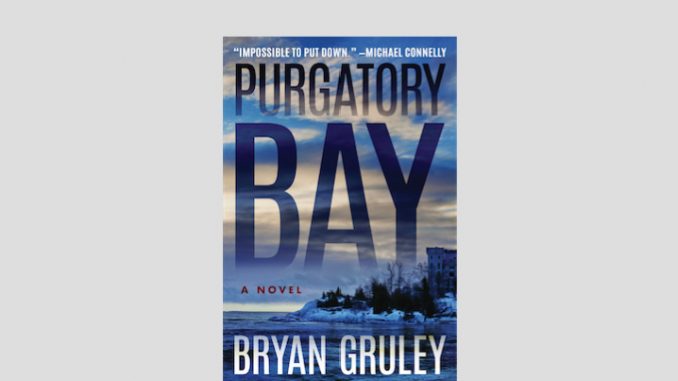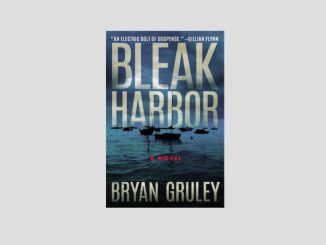
Late last month, I had the opportunity to speak with Bryan Gruley, author (most recently) of Purgatory Bay (available now from Thomas & Mercer), which is undoubtedly one of the most spellbinding mysteries I’ve read in some time. Centered around Jubilee Rathman — a young woman who, following the murder of her family some years earlier, spends her life hidden away in a highly secure compound near the town of Bleak Harbor, Michigan, and spends her days seeking revenge —, the Petruglias (a notorious mob family), and a journalist-turned-associate director of a literacy center, Michaela “Mikey” Deming (who Jubilee holds responsible for her family’s demise), it is a must-read. Read on to see what Bryan had to say about how Purgatory Bay came about, some of his recommended reads, and much more.

Andrew DeCanniere: To begin at the beginning, what led you to write Purgatory Bay in the first place?
Bryan Gruley: Sure. First of all, the very first seed of this book came when I woke up in the middle of the night and, for some reason, I had the words to Ophelia by The Band in my head. It goes “Boards on the window, mail by the door. What would anybody leave so quickly for? Ophelia – Where have you gone?” So, that was my first conception of the character, Ophelia, who disappears early on in the book. Then, as I say in the acknowledgements, there was this mass murder I read about when I was a kid in Detroit. I was 10 years old and this family — the Robison family — was in their cottage in northern Michigan, and somebody broke in and just killed them all. They weren’t found for two or three weeks. It was in the paper all the time. A year or two later, my parents bought a cottage up north, not far from where those people were killed, and I used to lay in my bed in our cottage thinking about when this guy is coming to kill all of us. They hadn’t caught the guy, so — it was just some guy up there, right? That stayed with me all of these years, so I grabbed that and sort of used it as a precipitating event in Jubilee’s life.
DeCanniere: I have to say that’s a pretty horrifying story. No wonder you would lay awake at night and remember it all these years later.
Gruley: You know, they did figure out who they thought it was who’d committed the murders, but he’d killed himself. So, formally they didn’t conclude the case.
DeCanniere: I mean, at least he wasn’t out there continuing to kill. You can’t really put a positive spin on it, but at least he wasn’t out there continuing to harm people.
Gruley: Yeah. He had a motive. He was a former employee of the father of the family, but I was just a kid so my imagination ran wild. Here I am, fifty years later, letting my imagination run wild again.
DeCanniere: Though, it should be said, there are some huge differences between one of the main characters in the book, Jubilee Rathman, and the Chief of Police of Bleak Harbor, Katya Malone, it also seems there are some things they share in common as well — which the Chief seems to see.
Gruley: Yeah. She sees somebody who has experienced tragedy in their life — an even greater tragedy than she herself has experienced — but both of them have lost loved ones in their past, and Katya is there to support her when Jubilee is doing her thing with the organization she has established to help prevent suicide. So, there is some empathy there — and, of course, to some degree, as Katya slowly realizes what’s really going on, it’s discomfiting for sure.
DeCanniere: Switching gears a bit, I also think that your book is very timely in that it sort of highlights the dangers certain technologies — namely drones, in this case — can pose. Sometimes I just feel like we, as a society, are recklessly pursuing some sort of future that seems straight out of The Jetsons, without really stopping to consider the potential negative consequences that some of these technologies could have. In Purgatory Bay, for instance, the drones are used for malicious purposes. Jubilee uses them to commit various crimes. So, I just think it certainly raises the myriad security issues our rush to embrace technologies such as these may pose.
Gruley: Definitely. I’m not really a techno guy. My kids would laugh. But I saw this video that, when I saw it, I thought was real. You can find it online. It was fictional, and it was created by some Silicon Valley guys who think drone technology is headed in a very dangerous direction. They created this video that was supposed to be a shareholder meeting of a company that makes weaponized drones, and there’s this guy on a stage talking about how amazing these drones are. It shows this plane over some country, and thousands of these drones come flying out of the belly of the plane, and they have facial recognition technology, and they can go into a country and target individuals and kill them all. Still, these capabilities are there. I mean, there are these very intense weaponized drones. I also talked to some people who know about drones. It’s a complex technology, but there are definitely problems there, and I thought it was fun to have poor Caleb — lonely Caleb — name the drones after characters from Lord of the Flies.
DeCanniere: I also thought it was interesting how you touch on Mikey and Ophelia and their family, and how the accident that occurred, which took the life of their brother, Zeke, changed the trajectory of all of their lives. It sort of explores how things changed with their mother and, consequently, how the family dynamic changes following the accident. So, they, too, have experienced a pretty significant loss.
Gruley: Yes. The death of their brother, Zeke, for which Jubilee, of course, holds Mikey accountable. She says ‘You should’ve known better. You lived through this, and yet you foist this horror upon me and my family.’ She doesn’t go into much detail, but she does say to her ‘You should’ve known.’ I think Mikey takes that to heart. And she finally sort of accepts responsibility for her role in what happened [to the Rathmans]. Obviously, she’s not 100 percent culpable, but she contributed. She let herself be snookered by those two veteran journalists [she worked with].
DeCanniere: Right. And I guess it’s clear she does feel some responsibility for what took place. The whole thing does kind of make you question, as a journalist, when you are reporting on crime and that sort of thing, you obviously have to use some discretion as far as what you reveal. I feel like you’re walking a fine line, because you have a responsibility to report the truth of what is going on — to bring issues that could affect a community and its citizens out into the light. However, it does make you wonder where that line is, because it does seem in the course of writing this series of articles, she and the two others she is working with at the paper do seem to disregard the safety of this family. So, they put the family at risk as a result of a decision Robillard makes.
Gruley: Yeah. You know, journalists face decisions like that sometimes — whether it’s in a situation like that, where you are dealing with criminals who are dangerous, or you’re dealing with the military and you’re writing about war and stuff. You face decisions about what to print or what not to print, lest they put people in danger. In this case, Robillard — the journalist who is obsessed with this mob family — is like ‘These people put themselves in this position, so too bad. They’ve reaped all the benefits of this.’ If someone would have gone to them and said ‘Okay. If you print these stories, someone is going to kill this family,’ they might have made a different decision. They didn’t know that was going to happen and didn’t really envision it.
DeCanniere: And for this veteran journalist, Robillard, who has basically built his career reporting on this crime family — the Petruglias — it does seem like he has also benefitted from it in a weird way as well. When you learn more about him, it seems like he has developed a sort of addiction to reporting on them. His career is sort of built on reporting their latest exploits. So, while it may have, in part, been about exposing them, it seems like it was also very much about his reputation.
Gruley: I’ve known reporters like that — maybe not quite as obsessed as Robillard — who get obsessed with a story. I had a friend who was obsessed with finding Jimmy Hoffa. Of course, nobody has ever definitively figured out what happened to Hoffa, but this guy wrote story after story. He wanted to figure out exactly where he was and who killed him. He never got there.
Even in the most minor stories, you could say something or write something that hurts somebody. I don’t mean just hurts their feelings. I mean it could jeopardize their family or profession. Sometimes that’s what you’ve got to do, but you have to think about it before you do it, because frequently there are ways to not put somebody in jeopardy and still report what you need to report.
DeCanniere: I also think that there is some overlap between Edward Rathman and Ophelia, just as there is some overlap between Malone and Jubilee. I feel like when he saw an opportunity for money, he sort of jumped headlong into it, without really stopping to consider what he was getting into, what it would mean, and the potential consequences of it all — not only to himself but to his family as well. Similarly, when this Charlotte person shows up in Ophelia’s life, and she offers her this rather large sum, she kind of jumps in without thinking it over or getting to know more about who Charlotte is first.
Gruley: I hadn’t thought of that, but that parallel is there. Obviously I didn’t intend it, but it’s there.
DeCanniere: I also thought it’s interesting how Fisher — who later becomes Mayor of the town — and his father are both extremely corrupt and try to legitimize the business of blackmail. They try and equate it with journalism which, to me, is crazy. Real journalists don’t blackmail.
Gruley: Right. He likes to put it that way, even though he’s using it for nasty purposes.
DeCanniere: It seems that in everything he does, he does seem to be an opportunist. Even when someone is in trouble, he is unwilling to help unless there’s something in it for him.
Gruley: Agreed. And he becomes the leader of that community in that way, and sort of lords it over the community as Mayor.
DeCanniere: Which is disturbing, to say the least. Another way in which I thought the story is relevant to today is that it touches upon opioid dependence — which, as I think most people know, the opioid epidemic is a big problem in this country today.
Gruley: I’m glad you picked up on that. Yeah. And it would’ve been something that somebody in his position could very easily have gotten addicted to because of his need for pain medication in the wake of the murders and his burns and all of that.
DeCanniere: Switching gears a bit, the story does also touch a bit upon journalism and the changes in the industry that affected Mikey’s career — much as they’ve affected the careers of many journalists — and the various issues that they face day-to-day. I just found it interesting that your book also offers a bit of insight into that world.
Gruley: Definitely. That whole thing about quotations and who you can quote when they want to be off-the-record came from when I was at the Wall Street Journal. One of our top editors, Barney Calame, was the ethics czar. A reporter would be covering some big story, and they get the CEO of a company on the phone and the CEO doesn’t want to talk on-the-record. He doesn’t want to be quoted, so he gives this reporter a whole fill on background, and then in the story the reporter writes ‘Mr. or Ms. So-and-So declined to comment,’ but he didn’t decline to comment. He commented at length. He just didn’t comment on-the-record. But it’s a little double-blind so nobody thinks he talked, but he did talk. And Barney would say ‘You’re lying to the reader.’ It’s fine to use the information, so long as you corroborate it in the story, but you can’t say he declined to comment because he did comment. So, that made life rougher for some reporters, but it was the right thing to do. And that’s at the heart of the dilemma Mikey faces with her conversation with the Rathmans.
DeCanniere: And I would like to think that, at the end of the day, most people — certainly thinking people — know that journalists are not, in fact, ‘the enemy of the people.’ That said, in this day and age, as a journalist, I think that operating in the most transparent, above-board, ethical manner possible is more important than ever. Operating in a manner that is beyond reproach is more important now than it perhaps has ever been — certainly more important than it has been in a long time — because I think there are those in our society who are trying to frame journalists as the enemy. Some people in government are openly doing just that.
Gruley: The more transparent, honest and candid you can be, the better. You want to lay yourself open to criticism anytime — but particularly these days.
DeCanniere: And, last but not least, I always find it interesting — especially as someone who is always reading, and whose to-be-read pile is always growing — to learn what it is that you’re reading at the moment or what you might recommend yourself. Is there anything you’re reading — or have read — that you’d like to recommend?
Gruley: So, I am reading The Lucky One by Lori Rader-Day, our fellow Chicago writer. So far, it’s great. I haven’t read much of it yet, but she’s a very good writer. I just read a book that’s coming out in a couple of months called Don’t Ever Forget by Matthew Farrell. He’s a fellow Thomas & Mercer author and I thought it was great fun and dark at the same time. I like dark stuff. Those are the two that come to mind. In the non-fiction world, my son gave me Jeff Tweedy’s memoir, and I started it the other night. I had to read another book for a blurb I was doing for a friend, but I started the Tweedy thing just for fun, and I was like ‘Oh, man. This is going to be great.’ He’s a really great writer and has a good sense of humor. I don’t read a lot of non-fiction because, like yours, my day-job is non-fiction. So, when I can read for pleasure, I generally read fiction. On my nightstand, along with other books, is Salinger’s Nine Stories. It’s one of my favorite books of all-time and I just dip in there every now-and-then and read one of the stories.
Bryan Gruley is the Amazon Charts bestselling author of Bleak Harbor and the award-winning Starvation Lake trilogy of novels. He is also a lifelong journalist who is proud to have shared in the Pulitzer Prize awarded to the staff of the Wall Street Journal for their coverage of the September 11 terrorist attacks. Gruley lives in Chicago with his wife, Pam. You can learn more by visiting his website.


Be the first to comment